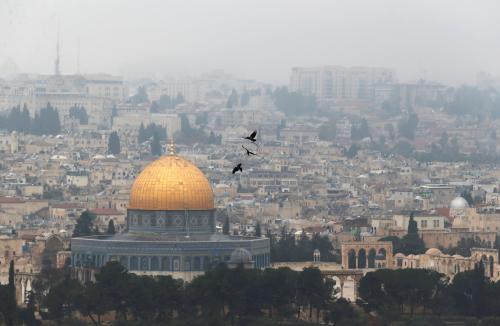Whether you’re for the U.S. plan to move its embassy to Jerusalem or against it, now that it’s happening, one thing we should all ask ourselves is if there is any way the United States can use the decision to bring Israelis and Palestinians closer to peace. There is, writes Hady Amr, but not in the way that is currently being rumored. This post originally appeared in The Hill.
Last December, when President Trump announced his recognition of Jerusalem as Israel’s capital, he broke with more than a half-century of U.S. policy toward recognition of Jerusalem as an international city.
Some cheered, others jeered. There was a U.N. vote. Life went on. Well, sort off. Since then, the Palestinian leadership has largely boycotted dealing with the United States publically. Conversations about Israel-Palestinian final status negotiations ground to a halt.
But Israelis and Palestinians continued to muddle through their relationship. In fact, they just signed an agreement on electricity sharing for the West Bank—important progress to peace-process geeks.
But on bigger things, as we approach the date that Trump says he will open the U.S. Embassy in Jerusalem—May 14—what can we expect? For starters, the world will likely not end. There are plenty of more-likely candidates to trigger Armageddon.
But by opening a U.S. embassy to Israel in Jerusalem, Trump will have made a dramatic shift in U.S. policy, essentially for zero gain in U.S. national security—or Israeli security for that matter.
While some on the Israeli right will cheer and feel validated and many Palestinians will condemn the decision, most others know that without a Jerusalem that is truly shared among Israelis and Palestinians, Christians, Jews and Muslims, there can never be a real and lasting peace.
Whether you’re for the move or against it, now that it’s happening, one thing we should all ask ourselves is if there is any way the U.S. can use the decision to bring Israelis and Palestinians closer to peace? There is, but not in the way that is currently being rumored.
The current word is that Trump will call on Israel to reclassify a handful of Jerusalem neighborhoods that are already almost entirely Palestinian as part of the West Bank.
Once upon a time, roughly two decades ago, such a unilateral Israeli move might have been heralded by the Palestinians as progress. Back then, it might have been seen as part of an initial Israeli transition toward the goal of greater Palestinian sovereignty in the “Holy Land.”
But not in the context of today’s strained relations in which Israel’s leaders vow to continue settling the Jordan Valley, which would need to be undone for any serious attempt at peace deal.
There are, however, steps that the U.S. could call upon Israel to take instead that would be far more meaningful to the Palestinian people.
First, the U.S. could call on Israel to unequivocally announce that they would allow Palestinians in East Jerusalem to vote in any future Palestinian national elections—just as they did in 1996 and 2006. This would remove an important excuse the Palestinian leadership has had in not holding national elections.
Second, the U.S. could call on Israel to immediately reopen the more than 20 Palestinian institutions, such as the Arab Chamber of Commerce and Industry, that were shuttered after the outbreak of conflict in 2000.
Third, the U.S. could call on Israel to change the way it issues permits to married Palestinian couples and their children to live in Jerusalem when one is from the West Bank and the other is from Jerusalem.
Finally, the U.S. could call on Israel to make per-capita public expenditures on education in Arab neighborhoods of Jerusalem equal to those in Jewish neighborhoods—as the Israeli High Court has mandated.
Israeli implementation of such policies would be far more meaningful to the Palestinian residents of Jerusalem and the Palestinian people writ large, than Israel stating the obvious: that they don’t want to be responsible for the day-to-day affairs of far-flung Arab neighborhoods of Jerusalem—some of which are already outside Israel’s security barrier—though they are happy to continue the occupation of the West Bank.
Otherwise, by calling on Israel to do something so clearly in its own self-interest and something that the Palestinians will rightly see as not living up to even the standard of prior Israeli proposals, the U.S. will not only be booed off the negotiating stage, but perhaps laughed off it as well.
The Trump administration may feel that it has the backing of some Arab governments in this regard, but as we saw in December on Trump’s initial Jerusalem announcement, that Arab backing will not tangibly materialize when it is rejected by the Palestinian leadership in Ramallah and while other Palestinians are dying at the Gaza-Israel demarcation line.
So, will Christians, Jews and Muslims be breaking bread together celebrating peace next year in Jerusalem as a result of Trump’s moves? Almost certainly not.
But there is something the Trump administration can do to nudge the process forward. Steps that tangibly improve the lives of ordinary people and signal that there is openness to dialogue about the future of the city will make all the difference.
The Brookings Institution is committed to quality, independence, and impact.
We are supported by a diverse array of funders. In line with our values and policies, each Brookings publication represents the sole views of its author(s).








Commentary
How the U.S. can make the most of its embassy opening in Jerusalem
May 9, 2018